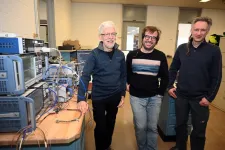(Press-News.org) People with a recent diagnosis of atrial fibrillation (AF), the most common irregular heart rhythm, have a modestly higher risk of developing dementia than people without the condition, according to research published today.
“Previous studies that have examined the link between atrial fibrillation and dementia have yielded conflicting results, and we hope that our study’s large sample size helps to establish confidence in our findings,” said Dr. Nisha Bansal, a professor of medicine at the University of Washington School of Medicine. “The study also included a community based, diverse population, which may increase the generalizability of our findings.”
Bansal was corresponding author of the paper, which appears in the Journal of the American Heart Association.
Atrial fibrillation, typically a very rapid heart rhythm, can spur blood clots in the heart, increasing someone’s risk for stroke and heart failure, and shorten lifespan.
“We know that atrial fibrillation is one of the strongest risk factors for ischemic stroke, but whether atrial fibrillation increases the risk of developing dementia independent of having a stroke has been unclear,” said senior author Dr. Alan S. Go, a senior research scientist at the Kaiser Permanente Division of Research. “If it does, it would have important clinical and public health implications given that atrial fibrillation is becoming more common nationally and internationally.”
The research spanned 2010 to 2017 and involved nearly 197,000 patient records from Kaiser Permanente health systems in California. Half of the patients had been recently diagnosed with atrial fibrillation; their counterparts in the control group were selected for similar age and health profiles but did not have AF. Both patient groups’ medical records were reviewed for three years, on average, to identify subsequent diagnoses of dementia, including Alzheimer’s disease.
Overall, people with newly diagnosed atrial fibrillation had a 13% higher risk of developing dementia. That risk appeared to be amplified in people whose AF diagnosis came before 65 years of age (65% higher risk) and people who did not have chronic kidney disease (20% higher risk). No such significant differences in risk were seen in patients’ sex, race or ethnicity.
The researchers used a methodology to mitigate the influence of other medical conditions also known to heighten dementia risk, Bansal said. So it was a surprise, she added, to find greater risk among relatively younger patients and those without kidney disease. As a nephrologist, Bansal is particularly interested in the influence of kidney disease on total body health.
“You don’t think about ostensibly healthier people being at a higher risk for serious health conditions — especially for a disease like dementia,” Bansal said.
The findings also show that risks of complications related to atrial fibrillation are not uniform in all patients, she said.
“Many people with atrial fibrillation will not develop dementia, but I think this is a conversation a patient with newly diagnosed atrial fibrillation needs to have with their doctor, weighing their potential individual risk of developing dementia, as well as weighing the risks and benefits of treating the atrial fibrillation.”
Bansal said the next stages of this research will aim to better understand the biological mechanisms linking atrial fibrillation and dementia, and studying whether different AF therapies — for instance, catheter ablation of the heart muscle vs. medication — affect patients’ trajectories for dementia and other complications.
The National Heart, Lung and Blood Institute (R01 HL142834) of the U.S. National Institutes of Health funded this work. The authors’ conflict-of-interest statements are in the published paper, which will be provided to journalists upon request.
END
Incident atrial fibrillation appears to heighten dementia risk
A large UW Medicine-Kaiser Permanente study finds modestly increased risk, with a stronger link seen among younger, healthier people
2023-03-08
ELSE PRESS RELEASES FROM THIS DATE:
Lunar telescope will search for ancient radio waves
2023-03-08
UPTON, NY—Scientists at the U.S. Department of Energy’s (DOE) Brookhaven National Laboratory are leading a new effort to land a radio telescope on the moon. If successful, the project will mark the first step towards exploring the Dark Ages of the universe.
The Dark Ages are an early era of cosmological history starting about 380,000 years after the Big Bang. There were no stars or planets in the Dark Ages. It’s a point in time that scientists have never been able to observe. Though radio waves from the Dark Ages still linger in space, the abundance of radio interference on Earth has masked these signals from scientists seeking to study them.
If ...
How a metabolite causes inflammation and disease
2023-03-08
A new study shows for the first time a connection between a mitochondrial metabolite and the activation of an inflammatory response. Mitochondria are functional units of our cells that fulfil important tasks, i.e. chemical reactions, for the functioning of the cell. One of these tasks is the production of energy that is necessary for cell growth and reproduction. If certain chemical reactions in the mitochondrion change, diseases occur. For example, deficiencies in fumarate hydratase (FH) in the Krebs cycle, one of the most important metabolic pathways in mitochondria, ...
'Other' race/ethnicity linked to higher suicide and overdose risk in military members with mild TBI
2023-03-08
March 8, 2023 – Previous studies have reported high rates of death by suicide and drug overdose – including opioid overdose – in military service members with a history of mild traumatic brain injury (mTBI). A new study finds that those risks are highest among military members with mTBI who identify their racial/ethnic status as "Other," as opposed to standard racial/ethnic categories, reports the March/April issue of the Journal of Head Trauma Rehabilitation (JHTR). The official journal of the Brain Injury Association of America, JHTR is ...
Cancer Grand Challenges announces global research funding opportunity with nine new challenges
2023-03-08
The National Cancer Institute (NCI), part of the National Institutes of Health, and Cancer Research UK have announced nine new research challenges aimed at tackling some of the most profound problems in cancer research. The global funding opportunity is part of the Cancer Grand Challenges program, an initiative launched by NCI and Cancer Research UK in 2020.
The research initiative aims to inspire bold new ideas that have the greatest potential for advancing cancer research and improving outcomes for people affected by cancer. The new round of challenges, announced March 8, 2023, during the Cancer Grand Challenges Annual Scientific Summit in London, is open until June ...
Genes in beans! Bean genome sequenced for improved nutrition
2023-03-08
The faba bean genome, which at 13 billion bases is more than four times the size of the human genome, has been sequenced for the first time and is published today (08 March 2023), in Nature. This is an extraordinary technical achievement and crucial to efforts to breed beans with optimum nutritional content and sustainability of production.
A consortium of scientists from Europe and Australia, led by the University of Reading (UK), Aarhus University (Denmark) and the University of Helsinki (Finland), worked together on this large scale sequencing project.
The project to fully decode the genome went on to test out its usefulness by searching for genes involved ...
MD Anderson research highlights for March 8, 2023
2023-03-08
HOUSTON ― The University of Texas MD Anderson Cancer Center’s Research Highlights showcases the latest breakthroughs in cancer care, research and prevention. These advances are made possible through seamless collaboration between MD Anderson’s world-leading clinicians and scientists, bringing discoveries from the lab to the clinic and back.
Recent developments include overlooked proteins from long noncoding RNAs that likely play a functional role in breast cancer, inhibiting tumor-associated neuronal cells to improve treatment response in pancreatic cancer, ...
Discovery of T cells’ role in Alzheimer’s, related diseases, suggests new treatment strategy
2023-03-08
Nearly two dozen experimental therapies targeting the immune system are in clinical trials for Alzheimer’s disease, a reflection of the growing recognition that immune processes play a key role in driving the brain damage that leads to confusion, memory loss and other debilitating symptoms.
Many of the immunity-focused Alzheimer’s drugs under development are aimed at microglia, the brain’s resident immune cells, which can injure brain tissue if they’re activated at the wrong time or in the wrong way. A new study from researchers at Washington University School of Medicine in St. Louis ...
Newborn drug testing by race, ethnicity before and after recreational cannabis legalization
2023-03-08
About The Study: Researchers found in this examination of newborn drug testing at a Midwestern academic medical center before and after statewide legalization of recreational cannabis that clinicians ordered newborn drug tests more frequently for Black newborns when no drug testing was done during pregnancy. These findings call for further exploration of how structural and institutional racism contribute to disproportionate testing and subsequent Child Protective Services investigation, surveillance, and criminalization of Black parents.
Authors: Lauren Oshman, M.D., M.P.H., of the University of Michigan ...
Major North American oil source yields clues to one of earth’s deadliest mass extinctions
2023-03-08
The Bakken Shale Formation—a 200,000-square-mile shale deposit below parts of Canada and North Dakota—has supplied billions of barrels of oil and natural gas to North America for 70 years. A new discovery reveals that the rocks also open a uniquely informative window into Earth’s complicated geological history.
A research team, which included geologists from the University of Maryland, George Mason University and the Norwegian oil and gas company Equinor, developed a new framework for analyzing paleontological and biogeochemical data extracted from the formation’s rock. Using this technique, the team pinpointed a major trigger of several closely spaced ...
Study reveals new understanding of how androgen therapy affects breast tissue
2023-03-08
New insights into the effects of a hormonal treatment for transgender men, discovered by Cedars-Sinai investigators, could have implications for the treatment of breast cancer.
Transgender men who were assigned female at birth and identify today as male may take hormones called androgens to induce physical changes that help them align their physical appearance with their identified gender. Androgens such as testosterone are involved primarily in the development of male traits, although females also produce androgens.
Molecular changes observed in the breast tissue of transgender men undergoing androgen therapy may signal the potential ...
LAST 30 PRESS RELEASES:
SfN announces Early Career Policy Ambassadors Class of 2026
Spiritual practices strongly associated with reduced risk for hazardous alcohol and drug use
Novel vaccine protects against C. diff disease and recurrence
An “electrical” circadian clock balances growth between shoots and roots
Largest study of rare skin cancer in Mexican patients shows its more complex than previously thought
Colonists dredged away Sydney’s natural oyster reefs. Now science knows how best to restore them.
Joint and independent associations of gestational diabetes and depression with childhood obesity
Spirituality and harmful or hazardous alcohol and other drug use
New plastic material could solve energy storage challenge, researchers report
Mapping protein production in brain cells yields new insights for brain disease
Exposing a hidden anchor for HIV replication
Can Europe be climate-neutral by 2050? New monitor tracks the pace of the energy transition
Major heart attack study reveals ‘survival paradox’: Frail men at higher risk of death than women despite better treatment
Medicare patients get different stroke care depending on plan, analysis reveals
Polyploidy-induced senescence may drive aging, tissue repair, and cancer risk
Study shows that treating patients with lifestyle medicine may help reduce clinician burnout
Experimental and numerical framework for acoustic streaming prediction in mid-air phased arrays
Ancestral motif enables broad DNA binding by NIN, a master regulator of rhizobial symbiosis
Macrophage immune cells need constant reminders to retain memories of prior infections
Ultra-endurance running may accelerate aging and breakdown of red blood cells
Ancient mind-body practice proven to lower blood pressure in clinical trial
SwRI to create advanced Product Lifecycle Management system for the Air Force
Natural selection operates on multiple levels, comprehensive review of scientific studies shows
Developing a national research program on liquid metals for fusion
AI-powered ECG could help guide lifelong heart monitoring for patients with repaired tetralogy of fallot
Global shark bites return to average in 2025, with a smaller proportion in the United States
Millions are unaware of heart risks that don’t start in the heart
What freezing plants in blocks of ice can tell us about the future of Svalbard’s plant communities
A new vascularized tissueoid-on-a-chip model for liver regeneration and transplant rejection
Augmented reality menus may help restaurants attract more customers, improve brand perceptions
[Press-News.org] Incident atrial fibrillation appears to heighten dementia riskA large UW Medicine-Kaiser Permanente study finds modestly increased risk, with a stronger link seen among younger, healthier people


